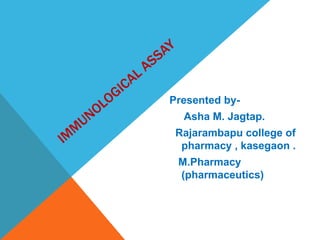Immunological assay
- 1. Presented by- Asha M. Jagtap. Rajarambapu college of pharmacy , kasegaon . M.Pharmacy (pharmaceutics)
- 2. An immunoassay is a biochemical test that measures the presence or concentration of a macromolecule or a small molecule in a solution through the use of an antibody (usually) or an antigen (sometimes). The molecule detected by the immunoassay is often referred to as an "analyte" and is in many cases a protein.
- 4. 1.RIA (RADIO IMMUNO ASSAY) It was developed by âRosalyan Yalow and S. A. Berson in the 1950sâ. Development of the âRIA for insulin; DEFINATION â It is a scientific method used to test antigens without the need to use a bioassay.
- 5. PRINCIPLE It involve competition between labelled and unlabelled antigen for binding with specific antibodies so antigen-antibody complex is formed .& radio activity is measured.
- 6. INSRUMENTATION It is an alternative technique employed in diagnosis of several antigen like hepatitis. It is competitive binding assay in which serum sample is combined with radioactively labelled antigen and antibodies to the antigen . The radioactive antigen and antigen specimen will compete for antibody .the antigen-antibody complex thus formed is isolated and analyzed for its radioactivity. The concentrations âstandard dose response curves;
- 7. DIAGRAMMATIC REPRESENTATION OF RIA.
- 8. APPLICATION 1. Detection of insulin. 2. Detection of narcotic drug .(morphine and heroin ) 3. Detection of digoxin . 4. Determination hydromorphon and hydrocondron in human serum . 5. Measurement of ferritin. 6. Thyroid testing .
- 9. 2.ELISA (ENZYME LINKED IMMUNOSORBENT ASSAYS) The ELISA is a fundamental tool of clinical immunology and is used as an initial screen for HIV detection. Definition â Enzyme-linked ImmunoSorbent Assay ,also called ELISA ,enzyme Immuno Assay or ELA is a biochemical technique used mainly in immunology to detect the presence of an antibody or an antigen in a sample.
- 10. PRINCIPLE Antigen âantibody interaction this test allows for easy visualization of results and can be completed without the additional concern of radioactive material used.
- 11. INSTRUMENTATION In which enzyme like alkaline phosphate is employed to visualize antigen-antibody reaction. TWO TYPE â 1. Direct ELISA ( double antibody sandwich) 2. Indirect ELISA ( direct antigen coating )
- 12. DIAGRAMMATIC REPRESENTATION OF ELISA.
- 13. 1. DIRECT ELISA It is performed in microtitre well, in which antibody to specific antigen is adsorbed to well, on which specimen containing antigen to be demonstrated is added. Unbound antigen are washed off and enzyme âlinked antibody specific for test antigen is added which binds to complexed antigen forming sandwich.
- 14. 2. INDIRECT ELISA - It is also performed in microtitre well, in which antigen to the antibodies demonstrated is adsorbed to well ,on to which patient antiserum specimen is added If serum contains specific antibody ,it will bind to the adsorbed antigen .un-reacted serum is washed off and enzyme â linked anti-HSIG is added, which will bind to antibodies in the initially formed antigen antibody complex.
- 15. APPLICATION 1. It is a useful tool for determination serum antibody concentrations.( such as with the HIV TEST) 2. For detecting the presence of antigen .it has also found applications in the food industry in detecting potential food allergens such as milk ,almond, eggs
- 16. APPLICATION 3. ELISA can also be used in toxicology as a rapid presumptive screen for certain classes of drug . 4. Diagnosis of infection .
















